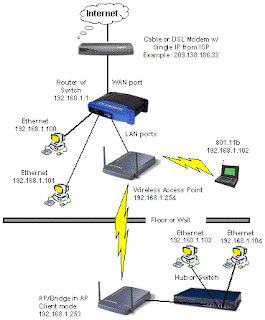Network Devices Part 2: Bridges
The term bridging was introduced before routers, switches and hubs were implemented, so
it’s pretty common to hear people referring to bridges as switches. That’s because bridges and
switches basically do the same thing—break up collision domains on a LAN
So what this means is that a switch is basically just a multiple-port bridge with more brain-
power, right? Well, pretty much, but there are differences. Switches do provide this function,
but they do so with greatly enhanced management ability and features. Plus, most of the time,
bridges only had 2 or 4 ports. Yes, you could get your hands on a bridge with up to 16 ports,
but that’s nothing compared to the hundreds available on some switches!
You would use a bridge in a network to reduce collisions within broadcast
domains and to increase the number of collision domains in your network.
Doing this provides more bandwidth for users. And keep in mind that using
hubs in your network can contribute to congestion on your Ethernet network.
As always, plan your network design carefully!





